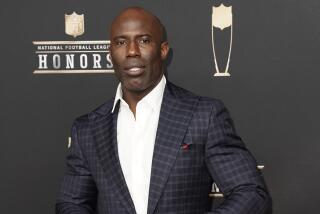United Is Refused Use of Simulator to Train New Pilots
- Share via
United Airlines’ effort to pressure its striking pilots into a settlement by hiring thousands of replacements has suffered a small but potentially significant setback from another airline, which turned down United’s request to help train strike-breaking pilots.
Frontier Airlines refused to let United use a Boeing 737 flight simulator at Frontier’s pilot training facility in Denver for $10,000 a week because it “was not in our best interest,” Frontier President Joseph O’Gorman said.
Opposition Cited
One of the reasons for Frontier’s decision was opposition from some of the flight training instructors, who are members of the Air Line Pilots Assn., a Frontier spokesman said Thursday.
Since the pilots union began its strike against United May 17, the airline has launched a campaign to “rebuild” itself by replacing striking pilots with pilots from other, lower-paying airlines.
United, which is flying only about 14% of its normal 1,550 routes, has vowed to expand service to 25% by July 1 and to have it completely restored by the first quarter of 1986. To do that, the airline has said that each month it plans to train 300 to 600 newly hired, experienced pilots in a two-week program at its training center, which is also located in Denver.
United, which pioneered the use of simulators in pilot training, has acknowledged that its 16 devices, located in Denver and other cities, are not sufficient to handle the number of strike-breaking pilots it hopes to recruit. The airline said it is arranging to lease simulator time with other airlines and private training schools.
Richard Grant, a striking United training facility instructor, told a 10-city “solidarity” tele-conference Thursday night that other airlines will also refuse to aid United rather than incurring the anger of their own pilots.
“The employee attitude” at Frontier “was certainly a factor” in that airline’s decision, said Bob Schulman, Frontier’s director of public relations.
As the strike completed its second week Thursday, it continued to resemble a war of attrition in which small incidents like the Frontier refusal became more meaningful to both sides.
The airline and the union last week compromised on the strike’s key economic issue--a two-tier wage plan to reduce salaries of newly hired pilots. But United declared Tuesday that talks on a back-to-work agreement will not be resumed until the pilots give up two items they say are critical.
The union wants United to commit itself to hiring 500 newly trained pilots who were offered jobs when the strike began but refused to cross the picket line. The union also demands that all flight attendants who are honoring the strike be rehired with no loss of seniority.
The airline says it cannot modify its position without losing credibility with employees. Similarly, the pilots say they cannot budge without losing credibility among their striking members.
A spokesman for the National Mediation Board said that no new talks have been scheduled.
Some industry analysts say that United, which has an impressive cash surplus, can tolerate the revenue losses of a prolonged strike for several months. Others say the airline has no intention of completely rebuilding the airline--because of the shortage of airline pilots. Currently, all but about 270 of the 5,200 union members who work as “line pilots” at United are on strike.
Thursday night’s tele-conference, which originated from Chicago, was the first time since the strike began that union officials made a mass address to their members. About 1,500 pilots, flight attendants and their families attended a Southern California rally in Long Beach.
United Chairman Assailed
The tele-conference featured frequently cheered barbs directed at United’s chairman, Richard Ferris, who the pilots contend is more interested in breaking their union than settling the strike.
The pilots union chairman, Roger Hall, called Ferris “vindictive and punitive” and said: “He wishes to etch into stone the divisions that have been created by the strike.
“We’re at a point in time where all this can be healed. The responsibility . . . must come from the corporation’s side,” Hall said, referring to the union’s request Monday that settlement talks begin.
More to Read
Inside the business of entertainment
The Wide Shot brings you news, analysis and insights on everything from streaming wars to production — and what it all means for the future.
You may occasionally receive promotional content from the Los Angeles Times.










